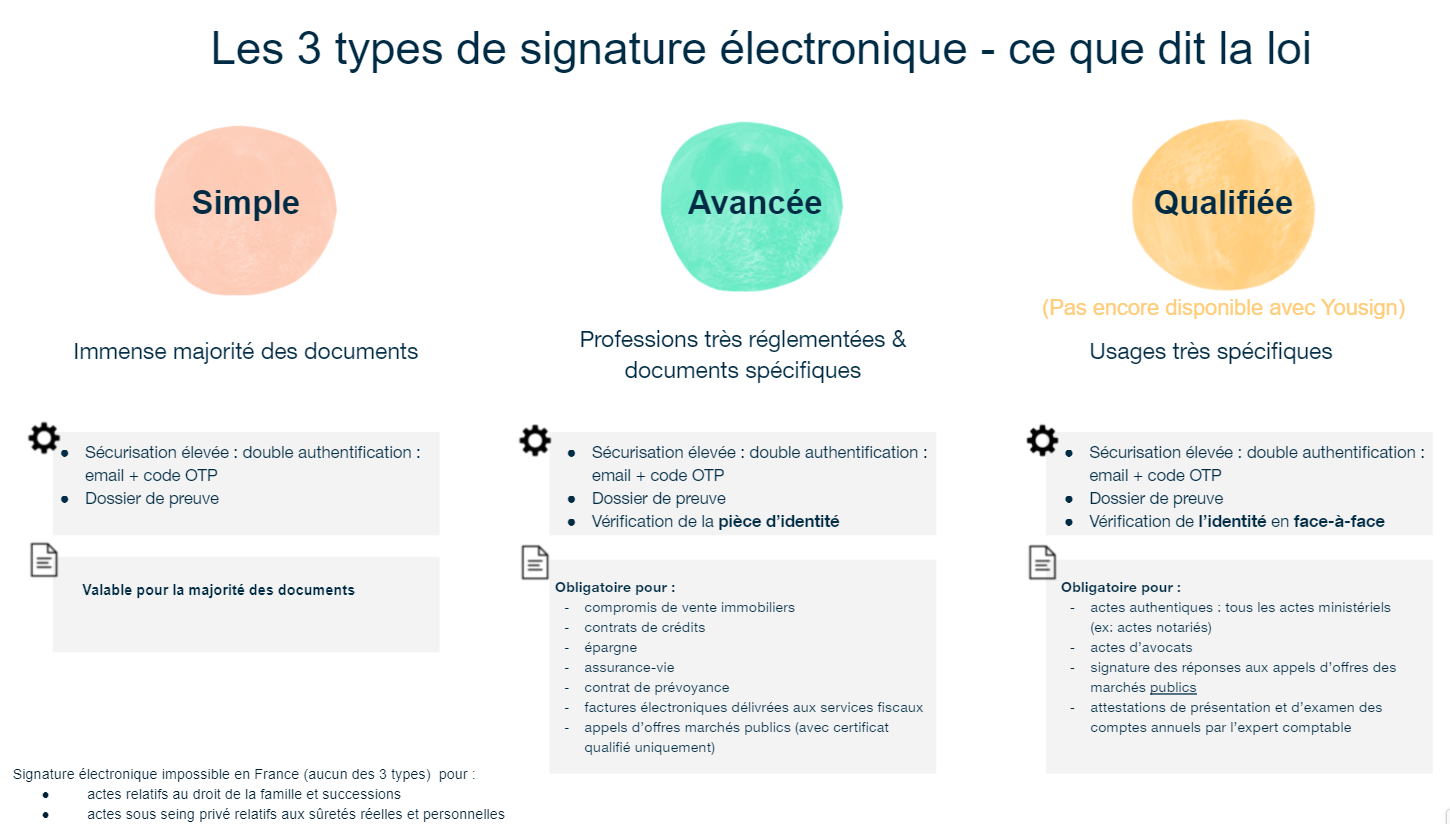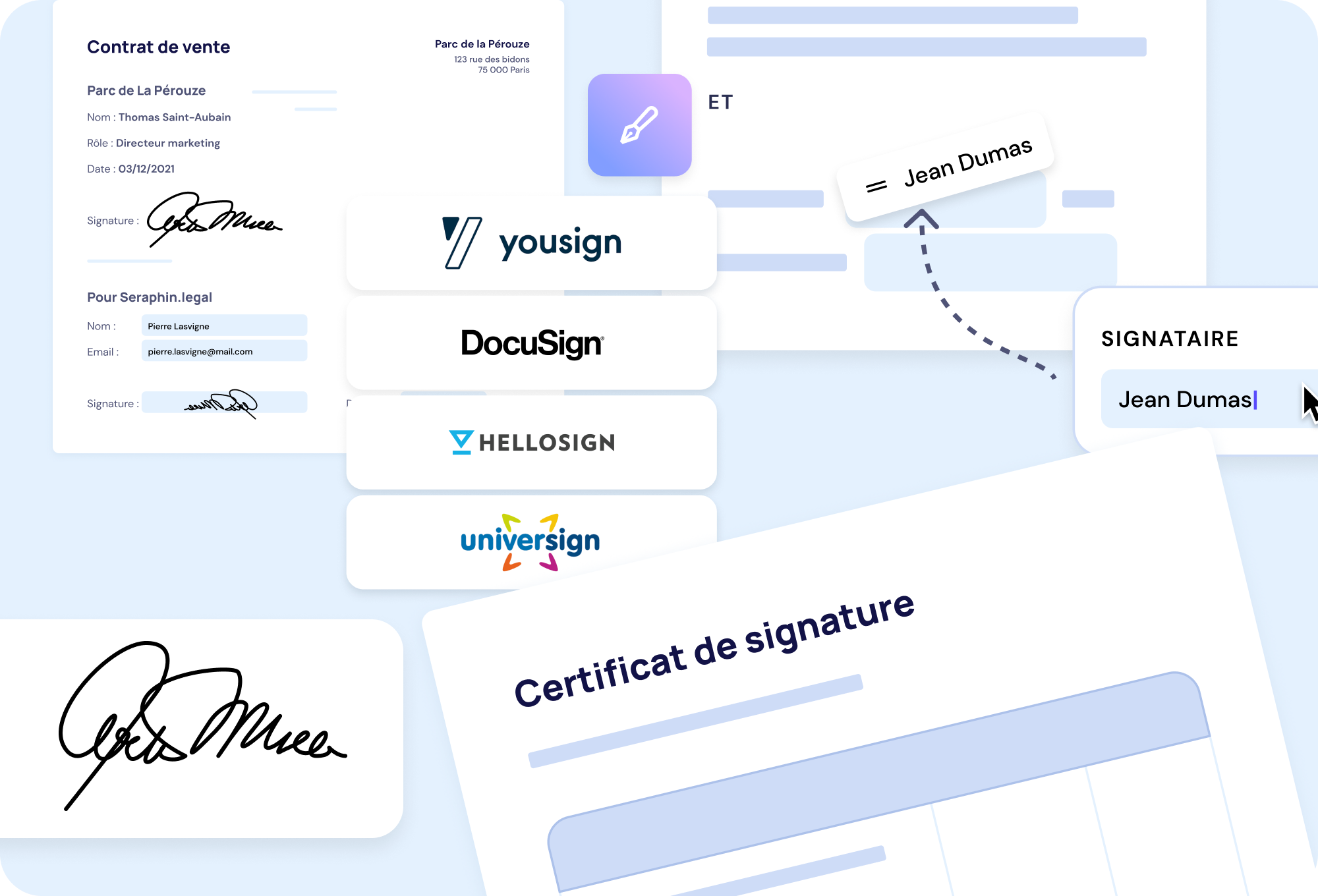What is the legal value of the electronic signature? In France, the electronic signature has been recognized since 2002. The 2016 European eIDAS regulation came to reinforce the validity of this technology by simplifying the legal framework for electronic signatures. This regulation has been transposed into thearticle 1367 of the civil code French law by putting the electronic signature at the same level as the handwritten signature : "The reliability of this process is presumed, until proven otherwise, when the electronic signature is created, the identity of the signatory assured and the integrity of the act guaranteed."
eIDAS Regulation: what is the legal value of the electronic signature in Europe?
eIDAS, or Electronic Identification and Trust Servicesis the European regulation governing the validity of the electronic signature in Europe.
The objective of this text is to unify the European regulations on electronic signatures in order to promote the use of this type of signature in cross-border transactions. electronic signature in order to promote the use of this type of signature in cross-border transactions.
This European regulation offers companies and individuals the possibility to sign their documents electronically in full legality and to use electronic signatures in full confidence. Indeed, an electronic signature that complies with the standards imposed by the eIDAS regulation has the same evidential value as a handwritten signature.
In France, the National Agency for Information Systems Security (ANSSI) is the national body in charge of implementing this regulation.
Here are some examples of important points of the eIDAS regulation.
A qualified electronic signature is valid throughout Europe
A qualified electronic signature, whose certificate has been issued by one Member State (e.g. France), is also recognised as a qualified signature in all other EU Member States (e.g. Belgium).
Ability to create qualified signatures in the cloud
Before the eIDAS regulation, it was necessary to obtain a smart card linked to a pin code to obtain a qualified electronic signature. This required a hardward, a physical software solution, which made the use of this type of solution complex.
Today, there is no longer any need for a chip, the innovation consists of offering the same level of security remotely from one's mobile phone for example.
The simple signature is just as admissible in court as the qualified signature
A simple signature is admissible evidence in court. This simple electronic signature does not require any concrete identity verification or consent process.
It cannot be refused on the grounds that it does not have the same level of security as aqualified electronic signature.
What are the conditions of validity of the electronic signature?
✅ Verify the identity of the signatories via different identification options (email address, access code, phone call, sms, ID verification etc.)
✅ Gather signatory consent on the agreement
✅ Link each signature to its signatory and to the signed contract
✅ Use Public Key Infrastructure (PKI) technology to protect documents
When can you use an electronic signature to sign legal documents?
Under French law, all legal documents can be concluded electronically and thus can be signed electronically. However, two categories of private documents cannot be dematerialized and therefore cannot be signed using an electronic signature:
- Private signature acts relating to family and inheritance law;
- Deeds under private signature relating to personal or real securities, of a civil or commercial nature, except if they are executed by a person for the needs of his profession.
What is the importance of a qualified timestamp?
A qualified time stamp guarantees the existence of a file on a given date and that it has not been modified since that date. Thus, documents sealed with a qualified time stamp in the European sense benefit from a presumption of accuracy as to their date and time of creation before all European jurisdictions.
Most electronic signature solutions include a time-stamping service qualified according to the European eIDAS regulation.
What are the conditions for the validity of the electronic signature?
The law requires the presence of a reliable identification process, i.e. it must allow :
- Guarantee the identity of the signatory;
- Guarantee the integrity of the document, i.e. prove that the signed document has not been modified.
What are the differences between simple, advanced and qualified signatures?
There are three types of electronic signature: simple, advanced and qualified.
What are the characteristics of the simple signature?
It corresponds to the first level of security and legal recognition of the signature of a document (no established legal requirement: for example, the signature made on a terminal to confirm the receipt of a delivery).
- The simple signature has evidential value
- The simple signature can be reinforced by adding an authentication step by email or sms for example
- Simple signature is recommended for contracts with limited legal risks
What are the characteristics of the advanced signature?
- Unlike the simple signature, the advanced signature must necessarily have identity verification criteria
- The advanced signature has evidential value
- According to the eIDAS Regulation, the advanced electronic signature must :
- link the signature to the signatory and uniquely identify him/her
- be created by tools exclusively controlled by the signatory (e.g. his/her phone)
- guarantee that the signed document cannot be changed after signing
- must include a digital identity based on a certificate (X.509 PKI) issued by a trust service provider. The ANSSI is in charge of identifying and evaluating qualified trust service providers to ensure their compliance with the eIDAS regulation.
What are the characteristics of the qualified signature?
- It corresponds to the highest level of security
- Qualified signature involves the issuance of a qualified digital certificate issued by a qualified trusted third party (QTSP)
- The qualified electronic signature has a legal value equivalent to the handwritten signature
- Qualified devices are issued in France by a certification authority acting under the control of the ANSSI (Agence nationale de la sécurité des systèmes d'information)
Here is a comparative visual provided by Yousign:

Which electronic signature solution should I choose?
To choose your electronic signature solution, you need to take into account different criteria such as cost, data security, location of physical servers...
Legal value of the electronic signature 👇
Check out our comparison of electronic signature solutions.
- Yousign legal value
- Dropbox Sign valeur juridique
- Docusign legal value
- Adobe Sign legal value
- Universign legal value
What about the use of electronic signatures in other countries?
The use of electronic signatures may present difficulties in other countries such as Canada, China, Russia, Singapore or Turkey. You should therefore be careful if you decide to use an electronic signature to contract with companies registered abroad or to sign documents subject to foreign law.
Choose to combine contractual performance and legal certainty
No commitment, no credit card.



